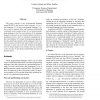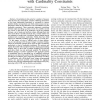167 search results - page 19 / 34 » Possibilistic-Based Argumentation: An Answer Set Programming... |
ICLP
2004
Springer
14 years 1 months ago
2004
Springer
The extended answer set semantics for logic programs allows for the defeat of rules to resolve contradictions. We propose a refinement of these semantics based on a preference rel...
VL
1993
IEEE
14 years 2 days ago
1993
IEEE
This paper presents a new programming language named SPARCL that has four major elements: it is a visual language, it is a logic programming language, it relies on sets to organiz...
ACL
2009
13 years 5 months ago
2009
In this paper, we analyze the impact of different automatic annotation methods on the performance of supervised approaches to the complex question answering problem (defined in th...
ICDE
2012
IEEE
11 years 10 months ago
2012
IEEE
— Uncertainties in data arise for a number of reasons: when the data set is incomplete, contains conflicting information or has been deliberately perturbed or coarsened to remov...
CORR
2004
Springer
13 years 7 months ago
2004
Springer
The field of machine learning (ML) is concerned with the question of how to construct algorithms that automatically improve with experience. In recent years many successful ML app...


